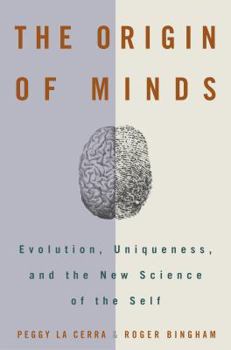The Origin of Minds: Evolution, Uniqueness, and the New Science of the Self
Explores the mysteries of identity and the evolution of the human mind and explains how inputs to each individual's system create a unique self and how to transform one's life through a series of... This description may be from another edition of this product.
Format:Hardcover
Language:English
ISBN:0609605585
ISBN13:9780609605585
Release Date:November 2002
Publisher:Harmony
Length:247 Pages
Weight:0.90 lbs.
Dimensions:0.9" x 5.8" x 8.6"
Customer Reviews
3 ratings
An extraordinarily clear account of the "world knot."
Published by Thriftbooks.com User , 17 years ago
As a practicing psychiatrist, the relationship between mind and brain is ultimately fascinating, although it is unlikely ever to be solved to everyone's satisfaction. Yet we feel compelled to try, and LaCerra's and Bingham's skillfully presented book is a giant leap toward correlating brain events with human experience and behavior. The lucid writing and excellent examples make it both intellectually stimulating and a joy to read. Although I agree with previous reviewers that this book skirts the many spiritual, religious, and philosophical issues involved in this ancient "world knot," the authors' intention was clearly to remain within their paradigm, and they elegantly achieved their goal of describing the physical concomitants of human subjectivity. In no way does such scientific research negate transpersonal efforts to explore the mystery of consciousness as a thing-in-itself, but instead lays a firm foundation for philosophers to build on. Highly recommended! John Nelson, author of The Remembering and Healing the Split.
This book explains things so well.
Published by Thriftbooks.com User , 21 years ago
This book is a great read for anyone who is intrigued with the workings of the human mind and nervous system, the capabilities of the mind, the tiny neurochemical happenings that make possible all the automatic and deliberately chosen activities of our mind and body, and language/neurolinguistics.The Origins of Minds sort of has the intriguing, poetic sensuality of Diane Ackerman's writing, but Minds feels by far more scientific. The sophisticated academic/medical/scientific language was worth the slight challenge it presented; the clarity with which the book's concepts and premises are laid out is awe-inspiring. Everyday metaphors are employed to make the most complicated concepts accessible, yet the authors let you know when they are oversimplifying, and why. The book is written with respect for the reader who perhaps studied biology a long time ago, or wants to nurture a recently born interest the incredibly interwoven workings and capabilities of body and mind.The book describes some of the less complex formations and abilities of "mind" as it operates in E. coli bacteria with memories just 4 seconds long, and in bees who know to return to successful nectar-gathering sites yet know to adapt to a better segment of flowers when the previously rich source tapers off. You learn about instinct, reflex, and neocortical activity-- a person's uniquely personal history that archives the environment, inner state(s)-- the idiosyncratic `adaptive representational network' which provides you at every moment with access to memories of past situations similar to the present one, and a menu of past and present choices accompanied by how each past choice has worked out and how each choice you might make now is most likely to affect your hierarchically organized motivations and desires.Living things are programmed to repeat behavior that assists in their survival and reproduction. The Origin of Minds explores and challenges this premise again and again, and it's quite elucidating and satisfying. What are our instincts and what ultimate purpose do they serve? How are instincts different from reflexes and why should it matter? How (and even why) does our DNA pass along certain physiological adaptations down through the generations? How is the hierarchy and intensity of our various and often competing goals organized in our psyches? What motivation underlies the development of a unique, individual personality and how does this conflict with or relate to our need for social cooperation for survival? You'll find it here.Also, the book describes the workings of dopamine, seratonin, noradrenaline, depression and even antidepressant medication with tremendous clarity and detail. Having often seen those subjects treated by authors in a cursory, oversimplified way (to the point of being unhelpful) for the non-medical professional, I deeply appreciate this book's responsibly fleshed-out information. Very accessible. An extremely enjoyable read.
Educational.
Published by Thriftbooks.com User , 21 years ago
If you enjoy learning intense subjects, keeping your dictionary handy, learning of the brain, and sorting out neuro-jargen you should check this one out. If you are a person of high intellect and enjoy learning of the brain and how it has evolved ( and evolving ) then this would be a good read. However, if you enjoy rudimentary leveled books, this isn't the one for you. I gave this book four stars because it was enjoyable, but not 5 star worthy.





